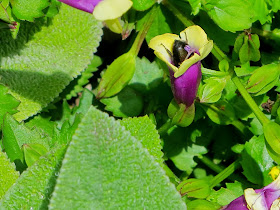 |
| Golden Crowned Kinglet, a new life bird for me |
Do you remember Theodore Roethke’s villanelle, and hymn, “The Waking” in which he offers, “I hear my being dance from ear to ear”? Jane Hirshfield’s “Like the Small Hole by the Path-Side Something Lives,” finds something similar, a somewhere within us, other than our conscious awareness, where there are small holes housing unknown critters. They live and die and go extinct, but we can know they do live and have lived within us.
I wonder if someone will accuse the poem of being Buddhism 101, but I don’t care; I find its imagery and its mind’s work very appealing. Click here:
Like the Small Hole by the Path-Side Something Lives in by Jane Hirshfield : Poetry Magazine
I like the quirky, homey, perhaps awkward phrasing of the important first and last lines, where I hear a lack of pretension, a kind of honesty, something like an inelegant elegance. Maybe Hirshfield had to work hard for that phrasing, but she’s made it convincing as a humble, likable, trustworthy statement.
Even the music in this realm is heard by something other than ears. Music as we know can be pretty good, but it would be too tangible, too logical and conventional for Hirshfield's realm. The music that matters is going
down some stairs, to a place beyond understanding, maybe even beyond hearing—beyond science and knowing. Yet it’s music, and it’s there.
 |
| Kinglet, bowing, reveals his golden crown |
The self is a “low field” with apples. If you’re not a politician or CEO, full of greedy ambition, that might be a pleasant and reasonable view of yourself. You’d rather be a quiet field than a king, or a gun, or other kinds of
machines that are “like loud ideas with tungsten bits that grind the day.”
I routinely get carried away with this or that idea, but how can anyone not love Hirshfield’s comparison of nasty ideas to cold, hard machines—metallic systems that make noise and break things up? Much better to be a field with apples.
But Hirshfield does not abandon or deny what we might call realism or rationality, if those are the words to describe ways of being that include matter and reason, but are not limited to them.
Nor are Hirshfield’s ways and perceptions a pie-in-the-sky, teddy-bear wonderfulness in our souls. And they feel less bombastic, but no less important, than Wordsworth’s “one soul within us and abroad.”
No, Hirshfield includes predation and extinction, and her landscape is a “low field,” not a snow-capped mountain or a sunset ocean. Her field’s apples are “small and blemished.” Hirshfield is not sloppily sentimental about whatever’s out there, down there, around there, inside all those holes.

If you were a small, blemished apple in a low field, however, you’d see that “a few escape” predation and other bad outcomes. That’s what passes for “a mercy.” It’s a qualified, limited, realistic mercy; therefore, we might dare to hope for it.

Are Hirshfield’s “self-map,” “self-clock,” and “self-scale” merely new, and New Age, takes on the familiar notion of a mysterious essence beyond physical forms? I don’t think so, but even if they are, the fact remains that she’s making us re-examine all that mystery, giving us new peeks at The Something, the whole possibility that there’s more to us, and everything, than we can understand or explain.













